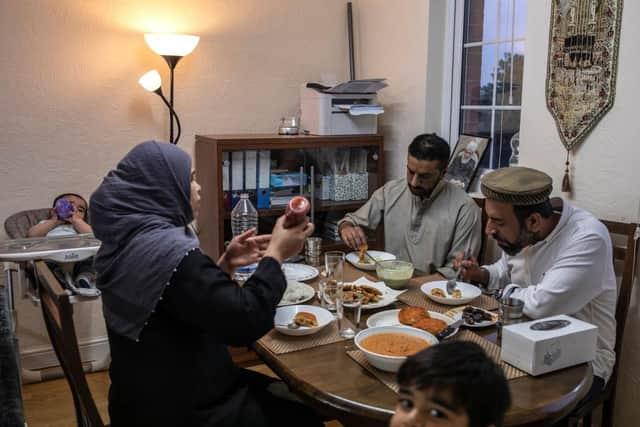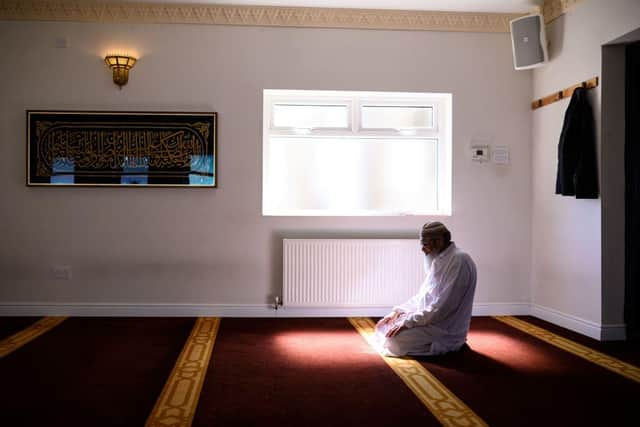Ramadan 2021: when is it in the UK, what is it, start date, when is Eid al-Fitr – and fasting calendar
and live on Freeview channel 276
Ramadan is a commemoration of Muhammad's first revelation, during which the Islamic prophet was visited by the angel Jibrīl (known as Gabriel in English), who revealed to him the beginnings of what would later become the holy text of the Qur’an.
Here is everything you need to know about this year’s celebrations.
Advertisement
Hide AdAdvertisement
Hide Ad

When is Ramadan 2021?
Ramadan begins with the sighting of the first crescent of the new moon in the ninth month of the Islamic calendar, itself called ‘Ramadan’.
Ramadan lasts between 29 and 30 days, but its exact start date shifts slightly every year due to the observance of the lunar calendar.
That means celebrations fall around 11 days earlier each year, which is why many non-Muslims often find themselves caught off guard by the holiday’s variable start date.


As one of the most important observances of the Islamic calendar, practising Muslims will know exactly when it takes place, and will be preparing for a month of fasting and an increased importance on the Salah – or their daily prayers.
Advertisement
Hide AdAdvertisement
Hide AdAnother quirk of the moon’s cycle means that Ramadan can technically start on different dates, depending on where in the world you are situated.
Many Muslims insist on a local physical sighting of the moon to mark the beginning of Ramadan, but others use the calculated time of the new moon, or the Saudi Arabian declaration following the sighting of the moon over the holy city of Mecca.
Muslims who live in far-north of far-south regions with a midnight sun or polar night are advised to follow the timetable of Mecca, though many follow the timetable of the closest country in which night can be distinguished from day.
This year, Ramadan is commonly agreed to begin on the evening of Monday 12 April in the UK, and will end on the evening of Wednesday 12 May.
Advertisement
Hide AdAdvertisement
Hide AdHow is Ramadan observed?
The holy month is a time of reflection and purification, so Muslims focus on prayer and fasting during Ramadan, with the Salah (daily prayers) of key importance.
All practising Muslims who have reached puberty are expected to fast during Ramadan. However, there are some exceptions, including menstruating or pregnant women, and people who cannot fast for health reasons.
The fasting period begins with sunrise, and ends at sunset. As the period between sunrise and sunset changes throughout Ramadan, so too do the fasting times; with this year’s celebrations taking place in spring, the days grow longer as the month progresses, so fasting periods increase in length.
The fast’s strict rules include abstinence from food and drink, including water, during daylight hours for the entire month.
Advertisement
Hide AdAdvertisement
Hide AdThe daily prayers also coincide with the hours of the fast, as Muslims sit down to the pre-fast meal of Sahūr before sunrise, finishing the feed with the day’s first prayer, the Fajr.
The fast isn’t broken until sunset with the Iftar meal, which is eaten before the Maghrib, the fourth prayer of the day.
As Islam is a faith followed by 1.8 billion people globally, sunsets and sunrises vary from location to location. and not all Muslims will break fast at exactly the same time.
As part of Ramadan, smoking, sex and masturbation are also prohibited.
Advertisement
Hide AdAdvertisement
Hide AdFor a full breakdown of fasting and prayer times throughout Ramadan 2021, head to our guide here.
When is Eid?
This year, Eid al-Fitr - also known as 'The Feast of Breaking the Fast' - will begin on the evening of Wednesday 12 May, and end on 13 May.
However, the meal – usually marked with lavish spreads of food shared among family and friends – will look considerably different than usual again this year, as no part of the UK is expected to reintroduce indoor private gatherings until at least 17 May.
Will Mosques be open this year?
In 2020, mosques were forced to close to the public during Ramadan due to coronavirus restrictions.
Advertisement
Hide AdAdvertisement
Hide AdTherefore, it will be welcome news that Muslims in England will be able to attend their local mosque to participate in prayers, as long as they adhere to social distancing rules and Covid-secure measures that must be in place to allow places of worship to legally open.
The same goes for those in Scotland where places of worship have been able to reopen for socially distanced prayer from 26 March.
But in Wales, the Government has asked religious leaders to find alternative ways of worshipping, like video gatherings.